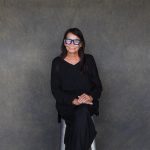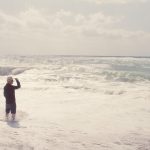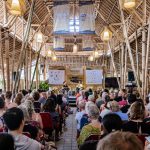The Icebergs pool at Bondi is one, if not the, most photographed, instagramable, destination swimming spots in the world. If you live in Sydney, chances are at some point you’ll be there. If you live on the other side of the world, chances are it’s somewhere you’re going to make time for when you visit. And there’s a lot of people who can’t get through a week without immersing themselves in its waters. So it seems perfectly natural that someone came along to make a record, a long-form snapshot of the place, and the people who spend time there. The filmmakers have said they imagine The Pool as a time capsule, and so it is fitting that there is an intentional lack of story arc or deep connection to subjects. Snippets of interviews that are incorporated into the film have the lightest touch with the personal, even bordering on the mundane, avoiding any particular characters moving to the front of the narrative. Instead the film takes the shape of the grand old pool itself, and studies how it carries all it’s swimmers along, both physically and emotionally, like a hippo carrying small birds on it’s back, with endless capacity, refreshed every day by a sunrise, and every moment by a new wave crashing in. Long, achingly beautiful shots of the water and all the glistening sun- kissed reasons that Icebergs is so famous are captured magnificently by Ben Cunningham. It sometimes feels closer to a retro surf film, or an art video, meditative, and stretching out through a largely 60s inspired soundtrack, with a photographic focus on the moment. Icebergs is beloved by many and has lots of layers, and even focussing on the members and the present is only scratching the surface, but it’s a lovely way to inspire a whole range of people to get back in the water.

directed by Ian Darling
produced by Mary Macrae and Ian Darling
editor Sally Fryer
director of photography Ben Cunningham
composer & sound design Paul Charlier
executive produced by Margaret Simpson- Lee, Paul Wiegard, Geralyn White Dreyfous, and Kate Hodges.
from Shark Island Productions
In cinemas November 7th
Premiered at Sydney Film Festival 2024
Currently touring through Sunshine Coast Film Festival, Byron Bay Film Festival and Adelaide Film Festival.
Starring a multitude of swimmers and members of Bondi Icebergs Club
Irresistible sat down with the director Ian Darling, after a few laps at Icebergs, to test the waters.










You’ve worn a lot of different hats in your life- which hat are you most comfortable wearing now?
What does the future look like for documentary filmmakers?
“Documentaries are lucky if they break even. There has to be all the funding elements working for the film, the philanthropic funding, and the producer offset, as well as government and industry funding. If one third of the budget is raised from a sale or cinema release that is good. The investment model is broken. You can’t produce a recurring income stream if every investor is told they will lose money. It’s better to think instead about providing grants and delivering a return on social capital rather than an investment return. Successful documentaries have been able to show exactly that and demonstrate a multiplier effect.













